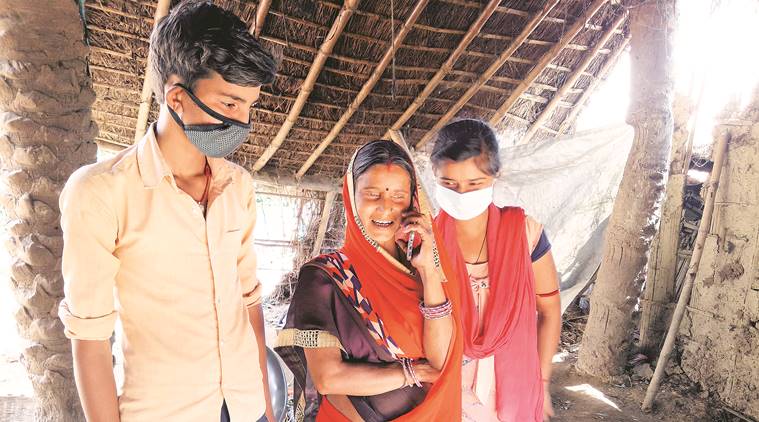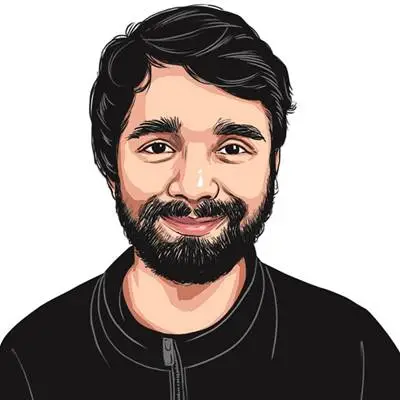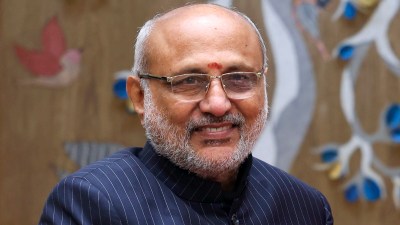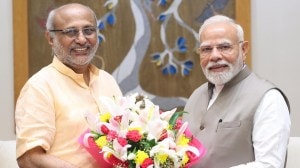Four days and nights he pedalled with his cart, hoping that if he tried hard enough, he could get from Old Delhi to Madhubani in Bihar. He made it as far as Gonda, half-way to home. A fortnight later, he is still there, afraid even his body wouldn’t make it to his village if he gets COVID-19, as his family keeps urging him to return. The Indian Express reports on a family’s despair and its growing worry, that no one might care enough for poor like them
A CARTON containing a television set, a stove, a red bag with four shirts, three trousers and a pair of jeans, a handful of steel utensils and two big plastic containers — just enough to fit into a handcart. It is all Sandeep Yadav owns. At 2 am on March 27 when he left Old Delhi in a hurry, Yadav put it all onto the cart, and rode. And rode. “Two well-dressed men came and told us there were buses taking people home. Everyone started running. I decided to pedal my way back… I couldn’t leave anything as I didn’t know when I would return… I can take my cart anywhere in NCR — Shahdara, Gurgaon, Noida. So, I thought, if four of us take turns pulling it, we can reach home,” says Yadav, looking older than his “37 years (he is not sure)” in his lean frame, tired eyes and salt-and-pepper beard.

Home is Madhubani in Bihar, around 1,100 km from Nai Sadak in Old Delhi’s Chandni Chowk where he lived. He made it as far as April 1 and 670 km, when he was caught by police along with four others, including his brother Ramanji, and brought to a shelter in Gonda. There were others in the group who rode their rickshaws from Delhi with him, and managed to escape.
Follow Coronavirus LIVE Updates

Story continues below this ad
Ramanji fled the shelter the next morning, hitch-hiking on trucks, reaching home in five days. But Yadav couldn’t; he couldn’t take his handcart.
At the shelter at Shaheed-e-Azam Sardar Bhagat Singh Inter College in the Gonda district headquarters, 14 days later, there are 63 of them — 22 caught coming from Jaipur, seven belonging to Jaipur, two from Himachal Pradesh, two from Jalandhar, six from Indore, four from Meerut, six from Bihar and two from Nepal. The largest chunk are from different districts of UP itself.
Cots have been put up for them in the corridors, with mosquito nets draped on each.
Read | By revealing magnitude of migrant worker phenomenon, COVID-19 points to rural distress
Story continues below this ad
Recalling those five days when home seemed just one more pull of the cart away, against the heat and throbbing body ache, Yadav says he and the others would start while it was still dark and keep going till 10 pm, with halts. “We would start peddling at 3 am, cook a heavy meal on my stove and eat around 8 am, take two hours of rest and set off again. At 3 pm, we would take our lunch and go non-stop till 10 pm. Then, we would park somewhere — near a temple, a hotel — take a nap for three hours, and start all over again.”
Yadav left Delhi with 2 kg of rice and arhar dal each, a litre of mustard oil, 2 litres of kerosene for the stove, and some borrowed money. The rations were not enough, but “people helped us”, Yadav says, opening shops to give them food items along the way.

Their bigger fear was police. However, Yadav says he was in for a surprise. “Police are never kind to the poor. But it was a policeman who helped us cross the Delhi-Uttar Pradesh border at Bareilly. He was a bada sahib, I know because of the stars on his dress. We somehow reached Barabanki, but then, near the Ghagra river, we lost the others because my brother wanted to rest,” says Yadav. “When the day passed and we still could not catch up with them, five of us decided to halt near a petrol pump for the night. Then, police came.”
Also Read | Migrant’s last earning before suicide: Rs 2,500 from sale of phone
Story continues below this ad
A fortnight later, with the lockdown extending his wait to May 3, Yadav says he doesn’t mind the food, arranged by the government, or even the mosquitoes. What is difficult to bear are the hours that stretch on, with little to do, and worry for the family and the wheat crop ready for harvest back home.
Yadav has a basic Nokia phone, and a prepaid connection giving him unlimited calls for Rs 149 a month. A friend in Delhi charged it for him just that day, he says. “After the recharge, I got a call saying I had won some prize. For a second, I thought it was true, but then I told the operator not to bother me,” he says. His two teenage children tried their best, but he never could get the hang of a smartphone.
Yadav calls home at least four-five times a day to catch up with them and wife Renu Devi. “I ask if they have food, other essentials. Not that I can do anything, but I can give them advice.”
 Sandeep Yadav with his possessions still in his cart, at a Gonda shelter for migrants. Yadav left Delhi in the middle of the night of March 26-27. (Express Photo by Vishal Srivastav)
Sandeep Yadav with his possessions still in his cart, at a Gonda shelter for migrants. Yadav left Delhi in the middle of the night of March 26-27. (Express Photo by Vishal Srivastav)
Yadav tries to pass his time sweeping the school corridors and, often, when no one is looking, watering the plants around the college. “I need something to do, otherwise I keep thinking of home,” says Yadav, worried that somebody may object. “I don’t know if taking water from the toilet for the plants is allowed.”
Story continues below this ad
There are four toilets for the 63 of them, but one is out of use as the door is broken. They wash and bathe in the open, fetching water from the toilet.
Explained | Indian migrants, across India
Yadav has dressed carefully for the meeting, in a bright-blue shirt with dots, black trousers and a cap saying ‘security’, with a ballpen clasped onto his breast pocket. As he talks, his eyes keep dropping down to his feet, shod in dusty rubber sandals.
Smiling shyly, Yadav says he always hoped to become a security guard with the government — perhaps explaining the cap. He has been wearing it since he found it on the road near Bareilly.
“I have led a hard life, pulling a cart, working as a labourer. A guard’s job is good, one only needs to be alert.”
Story continues below this ad
Born to a poor farmer family with seven children, Yadav never went to school. The maximum any one of the seven brothers studied was the eldest, Raj Kumar Yadav (60), who finished Class 12 around four decades ago. All of them work as daily wagers in Delhi, though three are currently back in the village. Their parents Ramdev (80) and Tetli Devi (75) live with either of their sons’ families.
Yadav has hopes of a better life for his children — Rahul, 17, and Priyanka, 19. No, there is no connection to the Gandhi family, he corrects.
Meghnad Desai writes | Need a plan to help migrants
Pulling the cart around NCR, mostly delivering stationery supplies, Yadav would earn about Rs 15,000 a month. Every two weeks, he sent Rs 2,000 home. He has been getting anxious calls from wife Renu. He says he initially told them he would stay at the shelter for 14 days and would be allowed to leave after the quarantine. “Now, I am hearing I cannot go till May.” About returning to Delhi, he doesn’t expect it for another couple of months.
Yadav last went home in March 2019. He planned to visit this month, for the wheat harvest. “The crop is ready and my wife and I are constantly fighting. Yesterday, she said I am enjoying my time here. However, I know she said it because she is worried. She is scared we will have to sell our buffalo. She cries every time we talk on the phone.”
Story continues below this ad
The buffalo and a calf that the family owns is their best investment, Yadav says. “Their milk ensures a regular income. Now my wife is saying she might sell the buffalo because we need money to repair our house. We have a kuchcha house that needs to be rebuilt every year.”
Read | ‘India’s coronavirus lockdown will spotlight migrants’ role in cities’
His heart breaks talking to his son, Yadav adds. “I think he lies to me about whether he is getting enough food, I think he is worried about me. I have not sent money for more than 20 days… If my family dies there or I die, who will be responsible?”
It’s 1 pm and the smell of the food being cooked in a temporary kitchen is wafting in. Semul Mandal, from Katihar district in Bihar, lying on the next cot (they are kept 2 ft apart), his eyes glued to his smartphone, quips, “It seems there is something special on the menu today.” Like Yadav, Mandal made a living pulling a handcart in Delhi, and was brought to the shelter the same day as him.
Story continues below this ad
Yadav says he sees people glued to their mobiles watching videos, listening to songs, but it doesn’t attract him. “If I was educated, maybe I could have learnt using those phones… but I don’t feel it is necessary.”
He doesn’t think about the food much, he adds. “Humein yahaan khoya bhi khila dein, toh woh mitti jaisa swad dega (Even if we are served the best of dishes here, they will taste like mud). Our heart is at home.”
However, he confesses, he is always hungry. Manual labour means he is used to eating more and often.
Food is served four times a day at the shelter. Breakfast, around 9 am, is usually tea, biscuits and poha; for lunch and dinner, green vegetables with dal, rice and roti; while for evening snacks, it is bread with tea or bread pakodas.
Story continues below this ad
The menu is decided by Amit Kumar Pandey, the in-charge of the shelter on behalf of the Red Cross, which is managing it with the local administration. Pandey says guidelines have been issued by the government regarding the food, while a counsellor comes and speaks to the residents at least twice a week.
According to Pandey, it is mosquitoes that are a major issue. After they made several complaints, mosquito nets and repellants were arranged by an NGO. “We couldn’t make sleeping arrangements inside the classrooms as the benches are screwed to the ground,” he adds.
Among the officials posted at the shelter are two lekhpals, two police constables, five members of the Red Cross, and three locals hired as cooks for Rs 1,500 per day.
Suddenly, sounds of clapping can be heard from the other side of the building. Some bank personnel have come to distribute hand sanitisers and masks. Garlands are exchanged and congratulations expressed. One of the residents, passing by Yadav’s cot, says, “Roz kuchch na kuchch tamasha hona zaroori hai (There has to be a show every day).”
Yadav hasn’t had a bad experience with the officials, but one incident left him shaken. A few days ago, he says, “They brought three new people and one of them refused to eat till he was given a blanket. A policeman made him stand with his hands on the wall and caned him. I asked the officials why they didn’t just give him the blanket, as it comes with the bedding, in a packet. He was then given a blanket, but he cried all night.”
According to him, he didn’t see the three again. “Someone said they escaped.”
Gonda SDM (Sadar) Veer Bahadur Yadav, who has nine such shelters under him, denies this.
Gonda District Magistrate Nitin Bansal says, “Some of the shelters are being funded by NGOs, while others are being run by funds from the district administration. The Sardar Bhagat Singh Inter College one is being managed by the Red Cross. The food and other facilities are looked after by the organisation.”
Regarding testing of the labourers for coronavirus, Bansal says only those who showed symptoms were tested. “None of the migrants has tested positive in the district.” Gonda had only one case till Saturday, of someone who came from Delhi.
But the government is being careful since an 18-year-old migrant labourer from Bihar tested positive at a UP shelter on April 11.
While he can usually console himself that he just has to wait through this period, Yadav has questions. “Why did the government bring in Indians from countries that had cases?” “Why were those people allowed to enter but we are being locked up?” “The government says we will be secure if we stay put, but how can we be secure if one half of a family is in Mumbai and the other half in Bihar or UP?” “Am I more secure with 60 others than my own home?” “Why can’t we be sent to our villages, are there no policemen there, no doctors?”
There is another gnawing question — that if he dies at the Gonda shelter of COVID-19, would even his body reach home? “I have heard there are problems with cremation of the people who die of the disease. Who will transport my body from here to Madhubani?” Yadav asks.
He concludes there is only one answer to all his questions. “It is because I am poor… I don’t think the government has time for people like me.”
On April 13, the Uttar Pradesh government announced that people from within the state can return home after they had completed 14 days in quarantine, but stay 14 days more in isolation once there. In Gonda’s nine shelters, only about 100 of the 300-odd are from within Uttar Pradesh.
Around 3 pm on April 15, SDM Veer Bahadur and a policeman arrive at the Gonda shelter, separate 20 of the migrant labourers, and ask them if they want to go home. They all nod repeatedly, smiling.
Passing by, helping carry foodgrain bags to the kitchen from a mini-truck, Yadav realises what’s going on. He does not say anything, puts the bags down in the kitchen, goes to his bed and sinks into it.
He hasn’t made many friends at the shelter, he says, his pain acute that no one from his district or village is here. “I wake up and everyone I see is a stranger.”
His head clutched in his hands, Yadav adds, “Though I am happy they are going home, this will make the wait worse… If officials allowed, I would leave… I can only hope. Ummeed bahut zaroori hai (One can’t lose hope).”
In a few beds around, several men are packing their belongings already, starting with folding of the mosquito nets. Yadav glances at them, then fixes his eyes on the wall, refusing to look their way.
Birsai village, Madhubani, Bihar
A narrow, half-metalled road takes one to Nav Toli in Madhubani district’s Birsai village — a cluster of 40-odd families with small agricultural plots and at least one member working outside the state. Sandeep Yadav left for Delhi to work over 20 years ago.
Wife Renu says they hardly spent any time together as a couple. They got married on March 8, 2000, when she was barely in her teens. “For the first time last year, we were together on our wedding anniversary.”
Every time he calls from the Gonda shelter, on son Rahul’s smartphone, the family crowds around it, while wearing their masks, putting Yadav on speaker phone.
When he calls up on Thursday afternoon, Renu’s first question is what he had for lunch. It’s rice, dal and a vegetable. Yadav tells them he feels like running away from the shelter, but that he is not sure if he can get past officials with his cart. “Is there a pass for a thela, like for other vehicles?” he wonders.
To lighten the mood, Renu queries him about their wedding date. As Yadav replies correctly, Rahul and daughter Priyanka smile.
Renu says she is somehow managing with the money they have. According to her, no government help has reached the family. Says Rahul, “Our ration card is linked to Aadhaar, but we have not got the Rs 1,000 government relief. Or the free 5 kg rice and 1 kg pulses for a month.”
Bihar Deputy CM Sushil Kumar Modi earlier said, “All 1.68 crore ration card holders in the state would get free rations by this month end.”
Birsai has more than 400 migrant workers.
While Priyanka gave her Class 10 board exams recently, Rahul will appear next year. Priyanka wants to do some “professional course” after Class 12, while Rahul says their father’s struggles have left him wanting to become something in life. “In whatever he earns, he has tried to keep us happy,” he adds.
None of the Yadav families has moved their families to Delhi. However, Priyanka and Rahul did visit the Capital once, when they were very small. Priyanka says they always hoped to return. “We want to see the Red Fort, the Lotus Temple, but Papa can’t afford a family trip.”
Renu adds that it is more unlikely than ever now. “The times ahead are difficult.”
Once Yadav comes home, the family adds, they won’t let him go back for a while. However, Renu adds, “Phir Delhi to unko loutna hi padega, kyonki yahan gujara nahin hoga (He has no option but to return, we can’t survive on earnings here).”
It’s been more than two decades, but Yadav’s mother Tetri Devi still recalls the day he left for Delhi, when barely 16, to join his brothers there, even what he was wearing. “Ek ganji aur pant dele rahiye. Wahi pahankar Dilli gelay (I had bought him a vest and shorts. He was wearing that).”
 At their home needing repairs in Birsai, wife Renu, and children Rahul, Priyanka talk to Yadav five-six times a day. “Renu breaks down every time,” says Yadav. (Express Photo by Santosh Singh)
At their home needing repairs in Birsai, wife Renu, and children Rahul, Priyanka talk to Yadav five-six times a day. “Renu breaks down every time,” says Yadav. (Express Photo by Santosh Singh)


 Sandeep Yadav with his possessions still in his cart, at a Gonda shelter for migrants. Yadav left Delhi in the middle of the night of March 26-27. (Express Photo by Vishal Srivastav)
Sandeep Yadav with his possessions still in his cart, at a Gonda shelter for migrants. Yadav left Delhi in the middle of the night of March 26-27. (Express Photo by Vishal Srivastav)







